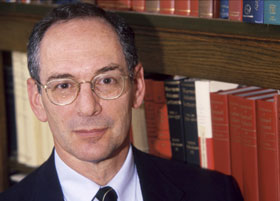For more archives, go to the Advance Archive/Search Page.
Brown Awarded NEH Grant For Microhistory Seminar
Sometimes studying an obscure historical event involving ordinary people can lead scholars to broader insights into a particular time in history. This approach to historical analysis is called microhistory.
 |
Richard D. Brown |
Thanks to a $110,000 grant from the National Endowment for the Humanities, a four-week seminar, Early American Microhistories, will be offered at UConn in June 2005 by Richard D. Brown, a history professor who specializes in microhistory.
Brown, Board of Trustees Distinguished Professor of History and director of the University's Humanities Institute, says he developed the seminar to enrich participants' understanding and use of microhistory in research and teaching.
"Since microhistory represents a relatively new approach - one that has not been taught in graduate schools - the purpose of the seminar is to develop the skills of scholars who have recently embarked on such a project, or who are considering one," he says.
"In the last decade, I've become convinced that this is one of the most effective ways to approach history. It combines scholarly rigor, a strong base of evidence, and compelling stories that can appeal to scholars as well as general audiences."
Brown and his wife Irene used the approach in their book, The Hanging of Ephraim Wheeler: A Story of Rape, Incest and Justice in Early America, which was published last year.
He says that while he and his wife were self-taught microhistorians, he is "convinced that others can learn this as well.
"By reading and discussing a variety of studies, participants will assess the advantages of different approaches to narrative," he says. They will also develop their own individual projects - either original research or the use of microhistory in teaching - and report to the seminar.
Brown encourages other faculty to seek out NEH grants to fund similar seminars in their fields. "Seminars like this increase the University's visibility," he says. "We have found in the past that scholars from all over the country who come to seminars return to their institutions and encourage their undergraduates to apply here for graduate school."
He says the seminar will be advertised nationally, and expects about 70 applicants. A UConn screening committee will select 15 people to attend the seminar.

